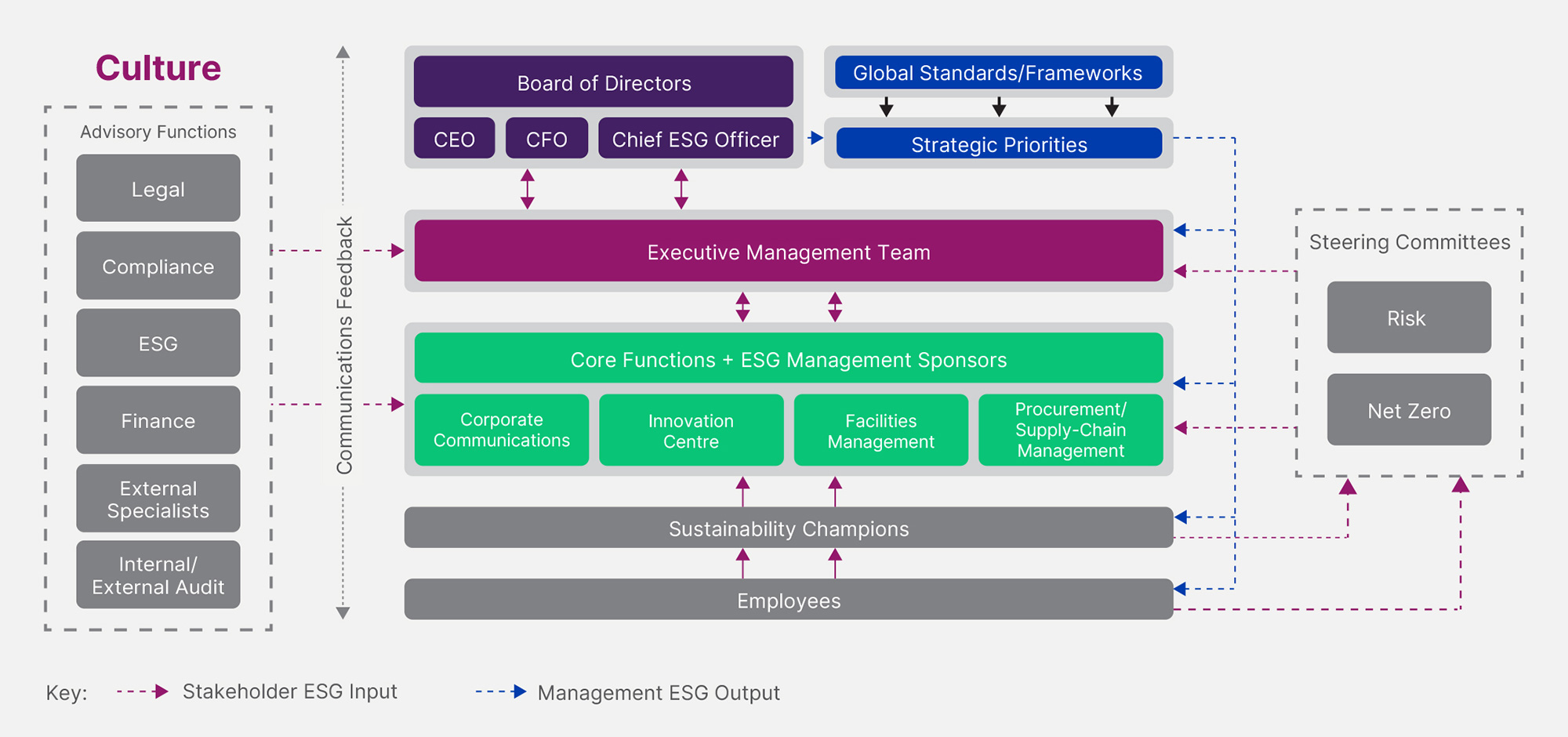Computershare aims to ensure that management of ESG topics is embedded across the organisation so we can develop the right company culture around ESG.
ESG governance structure
Our ESG governance structure ensures that the management and control of ESG risks are supported by a strong culture of governance and doing the right thing across Computershare.
We have cross-regional steering committees for Net Zero and modern slavery risk, and several advisory functions to support ESG governance across the organisation.

The Board has ultimate responsibility for ESG matters (including our Net Zero program), providing oversight across our ESG strategy and initiatives and actions specifically addressing climate change, as well as the development and adoption of sustainability policies and Computershare’s climate strategies. ESG is a standing agenda item for the Board and they receive a quarterly sustainability update, covering progress against our ESG strategy, Net Zero sustainability targets, and both global and local initiatives.
Computershare also has a recognition platform in place for recognising employees for positive contributions towards the management of ESG/climate-related issues, and we’re looking to incentivise as many employees as possible through the annual target-setting process.
Information Security

Protecting our information assets and customer data is vital to the success of our business.
Our global information and cyber security framework is aligned to ISO/IEC 27002, an international set of guidelines established by the International Organisation on best practices for managing information security.
Our information security function is supported by an information security strategy, an effective and forward-looking information security operating model and strong internal capability. The Global Information Security team is led by the Global Chief Information Security Officer (GCISO), who provides oversight and guidance on the overall development and implementation of the information security model across Computershare.
Information security is regarded as a critical business function and the GCISO has responsibility for managing the Information Security function. Each region is represented by security consultancy teams reporting into Regional Chief Information Security Officers (RCISO). These teams are supported by global specialist security teams covering cyber assurance, architecture, identity and access management, governance, and operation disciplines. These capabilities are further enhanced through working with specialist external parties.
All Computershare employees have their information security responsibilities clearly defined within a comprehensive global information and cyber security framework aligned to ISO/IEC 27002.
The Board receives regular reports from the GCISO that provide visibility of information security risks and oversight of their management. Security Key Risk Indicators (KRIs) are tracked and reported, enabling the management of increasing risk exposures. Our Privacy Policy is available on our website to inform all employees and clients of their privacy rights and how their data may be stored and used. Internally, we have a records retention schedule to ensure records are kept for the appropriate amount of time and then deleted according to our policy.
ESG-related group policies and codes
As part of Computershare’s overall approach to ESG governance, we’ve developed and implemented a suite of policies and codes. These are communicated to all employees through our mandatory learning platform and reviewed and maintained on an ongoing basis.
Environment, Social and Governance Policy
Fairness and Culture Policy
Global Code of Conduct
Human Rights Policy
Anti-Bribery and Corruption Policy
Whistleblower Policy
Supplier Code of Conduct
Modern Slavery Statement
Alignment to climate-related disclosures and frameworks
In addition to our internal governance structure, Computershare also aims to align with recognised global disclosure standards and frameworks, including the United Nations Sustainable Development Goals (UNSDG), CDP (formerly Carbon Disclosure Project), Task Force on Climate-Related Financial Disclosures (TCFD), Sustainability Accounting Standards Board (SASB) standards and International Sustainability Standards Board (ISSB) standards.
Computershare is also now actively preparing to undertake mandatory sustainability reporting disclosure as required by the new Australian Sustainability Reporting Standard (ASRS). Our first year for mandatory reporting will be for the financial year ending 30 June 2026.
